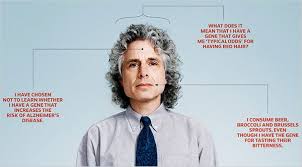If the Humanist Manifesto Were a Book It Might Look Like This
 Editor’s note: The following is a continuing and expanded review of Steven Pinker’s newly released book referenced in the previous post.
Editor’s note: The following is a continuing and expanded review of Steven Pinker’s newly released book referenced in the previous post.
In what must be the most robust recent defense of the 18th Century social, political, and intellectual movement known as The Enlightenment, Steven Pinker stays true to the movement’s foundations by methodically presenting its case in his latest book Enlightenment Now: The Case for Reason, Science, Humanism, and Progress (Viking, 2018), affirming his belief in the certainty of increasing progress and the widening of the availability of the necessities of well-being to more people across the globe. From the use of the human capacity to reason, tempered with another very human characteristic, sympathy, life is not nearly as pitiless and severe as it once was. Through the study of the natural sciences, whose practical applications are its fraternal twin offspring technology and medicine, a body of knowledge and infrastructure has evolved to provide more of the basic necessities for prolonging life and maintaining good health to an increasing number of the population.On the political front, the use of the rule of law, and rational debate and criticism in a better educated population in an open society helps identify and correct overbearing social and political injustices, and has resulted in less violence, fewer catastrophic wars, and a more even-handed distribution of human rights and wealth.
***
Pinker explains very early in the book that the Enlightenment principles of reason, science, humanism, and progress are in need of a “wholehearted defense,” since the wisdom that has been gained and the progress that has been made are not a “cosmic birthright,” but rather human accomplishments, and not guaranteed to advance or even remain at the current level of universality. He sets as the goal of the book to “restate the ideals of the Enlightenment in the language and concepts of the 21st century.” The movement has had its detractors almost from its beginning nearly 300 years ago. But today’s opposition can be classified in several major categories: ideologies that suggest people are expendable units of a “superorganism—a clan, tribe, ethnic group,race, or nation”; or religious appeals and theological promises of eternal life and transcendent salvation through belief in gods; concerns about the dangers of an unchecked rush to technology (the Frankenstein effect); the moral concerns of superabundance and the materialization and increasing emptiness of character associated with consumerism; and the movement away from the humanities disciplines in educational institutions in favor of STEM curricula. Aside from opposition from the human side, physical laws of nature also work against improvement, specifically the Second Law of Thermodynamics, which states that in a closed system, entropy does not decrease—which means, in practical parlance, that a physical arrangement either remains constant or tends to become disordered, so that no increase in ordering (which we can assume would, for the sake of the argument, be required to increase progress) can occur without investing energy captured elsewhere. As all of the concepts listed above have much to do with a certain ordering of the structures of animal and plant life, machines and structure, and information itself, a portion of any energy entering the system must be used to maintain the current standard or possibly increase the ordering (or lowering of entropy) for a beneficial outcome. The biological law of evolution is another burden to progress in a couple of ways: our genetic individuality “gives us our different tastes and needs, and it also sets the stage for strife.” Additionally, “our cognitive , emotional, and moral faculties are adapted to individual survival and reproduction in an archaic environment, not to universal thriving in a modern one.”
But two features of human cognition work to overcome the tendency of these natural laws and the ill-advised grand schemes of humans to resist order and progress: abstract thought and “combinatorial and recursive power,” which, combined with language and writing, are recorded and can be “shared across a community of thinkers.This allows large and connected communities to take shape and come up with ways of organizing their affairs that work to their members’ mutual advantage,” including all sorts of practical applications such as food production, transportation infrastructure design, and educational principles.
With this abstract background of his premise, Pinker proposes 15 theoretical topics as metrics by which to evaluate the overarching concept of progress, and a steady (if not always smooth) increase of conditions and results indicative of human well-being and flourishing are demonstrated. He uses a similar approach in his 2011 book The Better Angels of Our Nature: Why Violence has Declined. In Enlightenment Now, no fewer than 75 graphs are spread out among chapters titled
Life The Environment Equal Rights
Health Peace Knowledge
Sustenance Safety Quality of Life
Wealth Terrorism Happiness
Inequality Democracy Existential Threats
each chapter containing other confirming evidence drawn from the wealth of knowledge provided by the sources listed in the 20-page References section of the book. He makes what seems to an irrefutable case affirming the human condition has been improving, and that the principles of the Enlightenment—which is “also called humanism, the open society, and cosmopolitan or classical liberalism”—is the driving force behind it.
——————————————————————————————————————-

 So why, if the human condition is better for more people, doesn’t it seem like it? A shroud of pessimism has been a fixture in the psyche of modern man, and all the advances made since the dawn of modernism in the mid- to late 19th century seem to have been of little consolation. Certainly two major world wars, genocide, and the introduction of the specter of a nuclear Armageddon didn’t help. Existentialist and post-structuralist philosophies, social and cultural critics, and postmodern literature all help in unfolding and widening the shroud. In the chapter “Progressophobia,” Pinker sees a possible clue in this paradox of doom in the age of plenty in what psychologists Tversky and Kahneman call the “Availability heuristic: people estimate the probability of an (bad) event…by the ease with which instances [of it] come to mind. Frequent events leave stronger memory traces….” and thus establish as fact a questionable figment of that often unreliable source we call recollection. We hear from the news media of starvation in Africa, wars in the Middle East, but do not hear of the well-nourished in China or peace in Vietnam. So part of the “blame” in this positive feedback loop of pessimism and confirmation biases lies with the news media, with the academics and intellectuals, and some on the basic psychology of how we process and file incoming information. The author relates that he learned from interviewees’ questions and objections while working on The Better Angels that “resistance to the idea of progress runs deeper than statistical fallacies.” “The answer is to count,” he quips later.
So why, if the human condition is better for more people, doesn’t it seem like it? A shroud of pessimism has been a fixture in the psyche of modern man, and all the advances made since the dawn of modernism in the mid- to late 19th century seem to have been of little consolation. Certainly two major world wars, genocide, and the introduction of the specter of a nuclear Armageddon didn’t help. Existentialist and post-structuralist philosophies, social and cultural critics, and postmodern literature all help in unfolding and widening the shroud. In the chapter “Progressophobia,” Pinker sees a possible clue in this paradox of doom in the age of plenty in what psychologists Tversky and Kahneman call the “Availability heuristic: people estimate the probability of an (bad) event…by the ease with which instances [of it] come to mind. Frequent events leave stronger memory traces….” and thus establish as fact a questionable figment of that often unreliable source we call recollection. We hear from the news media of starvation in Africa, wars in the Middle East, but do not hear of the well-nourished in China or peace in Vietnam. So part of the “blame” in this positive feedback loop of pessimism and confirmation biases lies with the news media, with the academics and intellectuals, and some on the basic psychology of how we process and file incoming information. The author relates that he learned from interviewees’ questions and objections while working on The Better Angels that “resistance to the idea of progress runs deeper than statistical fallacies.” “The answer is to count,” he quips later.
Pinker does not address what is the most troubling premise of the primacy of reason in Enlightenment and progressive thought. That is the assumption that anything which cannot be defended by means of argument or experience must be dismissed. This is what philosopher Karl Popper calls “uncritical (or comprehensive) rationalism.” Since that assumption itself “cannot, in its turn, be supported by argument or by experience, it should itself be discarded.” It is “logically untenable,” and analogous to the liar’s paradox. This point lies at the heart of the criticism of rationalism itself, and leads to charges that rationalism is nothing more than another faith. Pinker does, in at least one place, demonstrate the “contra-paradox” involved in this match of dueling reason that one cannot argue in a logically valid form a case against reason. Think about it. Pinker also acknowledges that humans are not perfectly rational animals, and that what seem as perfectly rational ideas and actions one day prove to be off the mark the next. It is a self-correction process, much like the scientific method. It is trial and error and retry. Popper recommends tempering the function of reason to “critical rationalism,” with the understanding that, even though there is no axiom behind it, it is superior to abandoning rationalism altogether in favor of its antithesis irrationalism. To him “The choice before us is not simply an intellectual affair, or taste. It is a moral decision…. Rationalism is closely connected with the belief in the unity of mankind. Irrationalism, which is not bound by any rules of consistency, may be combined with any kind of belief in the brotherhood of man; but the fact that it may easily be combined with a very different belief, and especially the fact that it lends itself easily to the support of a romantic belief in the existence of an elect body, the division of men into leaders and led, into natural masters and natural slaves, shows clearly that a moral decision is involved in the choice between it and a critical rationalism.”(1) And Steven Pinker does make this point, over and again—the moral point, that is. Working “reasonably” together as humans, practicing a utilitarian, consequentialist ethics, and pulling back that dark shroud that drapes the modern age to reveal the lighted way forward is simply the only moral choice. Will Enlightenment Now become the Bible of secular humanism? Well, no: we don’t do Bibles; but a more comprehensive and persuasive polemic will likely be a long time coming; and one is not going to find a better sourcebook on current trends and topics in humanist thought.
(1) Popper, K. 1950,1956. The Open Society and Its Enemies. Princeton, N.J.: Princeton University Press. pp 417-418
Marty Bankson
The Humanist Advocate

